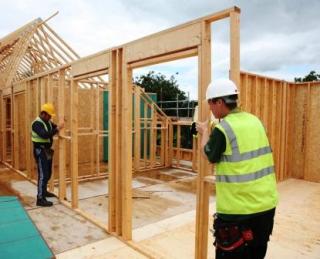Last week, we responded to BRE who are looking to develop a voluntary sustainability standard for new homes. With the Government set to axe the Code for Sustainable Homes in it’s current form, BRE are working on something to allow developers to differentiate their product in the marketplace by recognising performance beyond minimum regulation. In the BWF’s joint response to the standard with Timber Trade Federation, we set out a number of aims for what we would like to see realised in order for the standard to meet BRE’s aims and become a real industry driver for sustainable homes and housing projects.
These include:
– The standard needs to address the performance gap issue and ensure that the home is performing as designed. Skills shortages and site substitution have been undermining the performance of the construction products sector and manufacturers of durable, sustainable and high performance products have suffered on account of this.
– It should encourage the use of low impact materials that are appropriate to a project’s needs, for example through looking at genuinely sustainable sourcing of materials and rewarding sustainable off-site and modular construction technologies or resource-efficient factory finished solutions.
Examples of this are innovative projects such as the seven-storey Kingsgate House which used solid wood as an alternative to steel and concrete. The use of Cross Laminated Timber saved time, money and disruption in what is a busy and densely populated part of London and reduced the amount of embodied carbon on the scheme.
– It must account for embodied Carbon – with operational Carbon reducing, the critical element in terms of the lifetime carbon ‘footprint’ of the building is the materials used to build it with major sustainability gains possible through the choices. Wood absorbs and locks up carbon and is converted into product at incredibly low energy levels – displacing energy intensive alternatives and reducing pressure on the grid.
Although groundbreaking research on wooden windows has helped to demonstrate these benefits, this logic can now easily be applied to all products, for example the use of timber joist or wood based panels.
 Time will reveal what form the new standard takes or whether the government proposals to do away with the Code for Sustainable homes and incorporate housing standards into building regulations will ultimately be judged as a sensible move. BWF will continue to be involved with its development of the new standard and we will keep you updated on the next steps.
Time will reveal what form the new standard takes or whether the government proposals to do away with the Code for Sustainable homes and incorporate housing standards into building regulations will ultimately be judged as a sensible move. BWF will continue to be involved with its development of the new standard and we will keep you updated on the next steps.
BRE has also issued a draft 2014 version of the BREEAM UK Refurbishment and Fit-Out scheme. Comments are requested by BRE by 29th August; please respond directly. The BWF has been feeding back to BRE on this evolving scheme during the consultation.
When considering how we can get your voice across to government, and responding effectively to consultations such as this, the BWF manifesto has given us a useful point of reference, especially when highlighting how our £3.8 Billion industry supports the economy and how we help to deliver maximum results with minimum environmental impact.
The manifesto has now been sent to a number of MPs and notable industry figures, following up on our various interactions with policy makers
This is a once in five year opportunity to really raise the profile of the woodworking sector with politicians and decision makers, and we value and appreciate your support in making the most of it. Don’t forget to read our BWF: Getting your voice heard' leaflet which explains how you can support the campaigns at a local level or download out template letter and manifesto as a tool to engage with local decision-makers: www.bwf.org.uk/publications/general-business-support/2